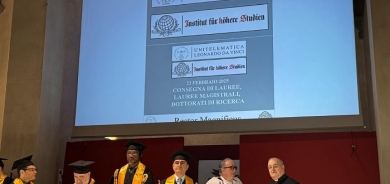Can Iraq's new PM, and the region, escape Suleimani's long shadow?
May 9, 2020
From Media

Mustafa al-Kadhimi’s rise from intelligence chief to the seat of national power had been unorthodox, as was the journey he had just made – from Baghdad, where high-stakes appointments like his had mostly been made over the past decade.
This time, Kadhimi’s fate was to be decided in another capital, Beirut, where the leader of Lebanon’s Hezbollah was waiting to receive him. Hassan Nasrallah had traditionally focused on affairs closer to home but now found himself thrust to the vanguard of Iran’s interests in the region with a casting vote on who would best represent them.
Last week, Kadhimi secured a government, thanks partly to Nasrallah’s endorsement. Yet throughout the horse-trading that eventually secured his cabinet line-up, the gaping hole exposed by Suleimani’s death was evident. “The Iranians and Iraqis are adrift,” said a source with close ties to Iraqi and Hezbollah officials. “The vacuum is as huge as it was when Hajj Qassem was buried.”
Such was the void caused by the death of Suleimani – dubbed Hajj Qassem by friend and foe – that nearly all the regional projects that had been under way in his name at the time have faltered. Sources in Iraq, Syria and Yemen in particular suggest that Iran’s Revolutionary Guards, and the Quds Force that projects its core interests, are struggling to maintain momentum.
Interviews with Iraqi and Lebanese officials show his replacement, Esmail Ghaani, struggling to assert his authority, even after doing the rounds of Iraq’s power base and the proxy networks that Suleimani had assembled over the 17 years of chaos that followed the US invasion.
“He doesn’t speak the language, doesn’t have the history in the region, and – to be fair to him – has been given a mandate that he can’t deliver on,” said an Iraqi official with ties to the country’s national security apparatus. “He was in Afghanistan for 12 years and can’t be expected to know the ways of the Iraqi tribes, or how things have been done here since the Saddam years.”
An image of Ghaani getting his beard trimmed during the Iran-Iraq war appeared on Iranian social media earlier this month, in an apparent attempt to make the new Quds Force leader more recognisable. On the same day, perhaps coincidentally, an Iranian publisher announced that Suleimani’s memoirs from the Iran-Iraq war, titled Our Blessed Comrade, would soon be released. Even as Ghaani’s backers tried to personalise him, his slain predecessor was eclipsing him from the grave.
In Iran, Suleimani’s role – as intelligence chief, special forces commander and presidential envoy to supreme leader Ayatollah Ali Khamenei – has effectively been broken down. No one is likely to win such broad authority again. Without the weight of Suleimani, the Iranian-backed militia networks established over the past 17 years are proving difficult to manage.
As Kadhimi edged closer to the top job, supported also by the US and Saudi Arabia, both of whom saw him as a leader outside of Iran’s grip on Iraq, he ran foul of one of Iraq’s most powerful militias, Kata’ib Hezbollah, which has accused him of facilitating the US operation that killed Suleimani, and their leader, Abu Mahdi al-Muhandis, on a Baghdad road in the early hours of 3 January.
In a statement issued in early this month, the group said: “During the sensitive times we are going through, the brothers in politics who brought Mustafa al-Kadhimi to be prime minister-designate should know before it’s too late that the man is not up to the responsibility that has been given to him and is still accused of a crime of which he hasn’t been acquitted.”
Weeks earlier, Kadhimi had sought a meeting with Keta’ib Hezbollah’s leadership under the auspices of Iraq’s president, where he tried to assure them that he had played no role in the deaths, but left open the possibility that an official in the Iraqi National Intelligence Service might have had contact with US spies.
“The informal agreement was that they would not stop him from getting the job, but would continue to talk out against him,” said an official familiar with the conversation.
“Kadhimi is facing so much pressure,” said an official connected to the Iraqi presidency. “There are rows between the Shia parties, who don’t see eye-to-eye on a lot. As for the Iranians, of course the loss of Muhandis and Qassem was a major blow; they’re rearranging their structures now. But have they lost control? Not at all, the proof is their meddling in the formation.”
With Kadhimi now Iraq’s premier decision-maker, US and Saudi officials are privately hailing a new era of Iraqi sovereignty. Washington pushed its allies in the country’s Kurdish north and Sunni centre to endorse him. “They think they’ve got their man,” a regional official said. “They’re celebrating. When will they ever understand Iraq?”
Additional reporting by Mohammed Rasool
The Guardian











